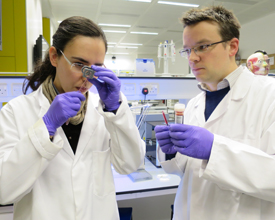University start-up awarded £1 million NHS contract to develop heart attack test
Release Date 15 December 2014

A test that could revolutionise the treatment of patients admitted to A&E departments with heart attack symptoms has moved one step closer to development.
Capillary Film Technology Limited (CFT), a start-up co-founded by Dr Alexander Edwards from the University's School of Pharmacy, has been awarded £1m by Small Business Research Initiative for Healthcare (SBRI).
The funding will be used to turn cutting-edge research, developed at the University of Reading, into a product which could play a crucial role in reducing stress for both patients and NHS frontline services, as well as save lives.
There are around 124,000 heart attacks in the UK. But many more suffer heart attack symptoms such as chest pains, the majority of whom will be transferred to an acute cardiac ward ‘just in case'. They are then faced with an agonising wait for diagnostic test results which take from six to twelve hours. In 2012 over 180,000 people were admitted urgently to cardiac wards with chest pains who were then discharged without further treatment.
By miniaturising laboratory tests into tiny tubes, about the size of a human hair, these analytical test occurs 20 times faster, and can be portable and disposable. Each device combines multiple tests providing more far conclusive diagnostic results than a single test.
Performing multiple tests quickly allows CFT's new test to diagnose heart attacks in the A&E department within 30mins, allowing heart attack sufferers to be treated more quickly. It will also rapidly reassure those who have not suffered an acute cardiac event, and free up bed space in specialist cardiac units. Crucially, in this time of pressure on health budgets, unlike other ‘microfluidic' technology, CFT's miniaturised tests are very inexpensive to produce.
Dr Alexander Edwards said: "We are thrilled to have received this funding from SBRI healthcare. It is estimated that hundreds of thousands of patients with symptoms of heart attack will be tested each year - most have not suffered an actual cardiac event. When developed, our new product will be a fantastic asset for both patients and A&E departments. Those who have suffered a heart attack will benefit from earlier treatment, while others with very similar symptoms will be able to travel home sooner and with more peace of mind."
Company CFT was co-founded in 2012 by Dr Edwards in conjunction with co-inventor Dr Nuno Reis (University of Loughborough) and key industrial partner Lamina Dielectrics Ltd, a UK manufacturing SME specialising in tubular technology. From having one first full-time employee, a Reading PhD graduate who joined in 2013, CFT will have five members of staff at the start of 2015.
Dr Edwards continued: "This is a fantastic example of university research and innovation being transferred into industry to help solve real-world problems. The new product will enter clinical testing in regional hospitals in 2016, with a launch expected at the end of 2017."
Dr Paul Durrands, Chief Operating Officer of Oxford Academic Health Science Network, said: "CFT's SBRI Healthcare funding success is a great example of how NHS clinicians, universities, and emerging UK health tech SMEs can be connected by the Academic Health Science Networks. It brings together patient benefit and economic growth in our vital life sciences sector, by delivering cost-effective innovation to solve real NHS problems.
"Oxford AHSN brought together a leading academic from the University of Reading with a leading clinician from Buckinghamshire Healthcare to develop an outstanding health technology for the benefit of NHS patients."
